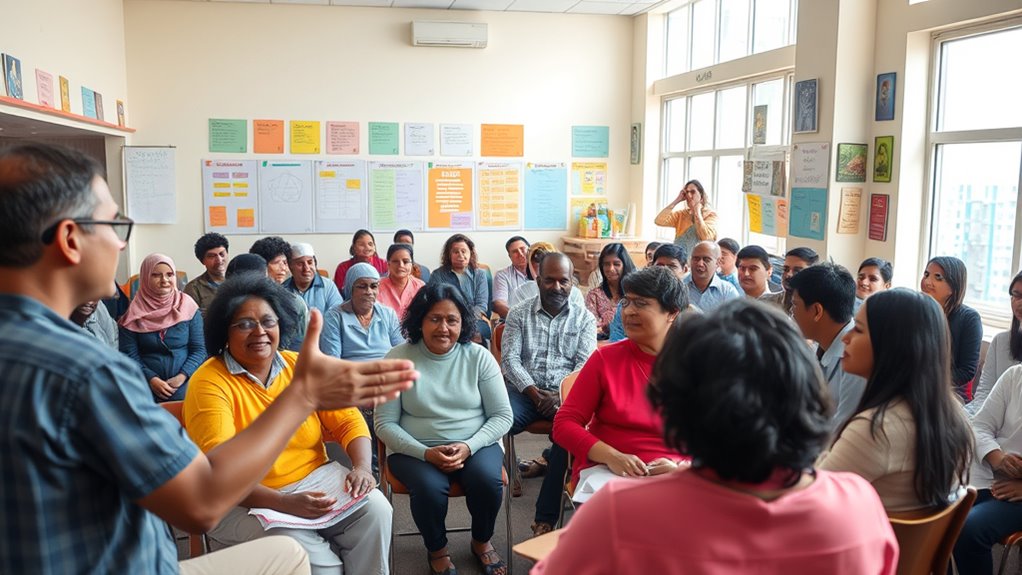You can find free Psychological First Aid (PFA) training offered in many cities. This training helps you support individuals recovering from traumatic events effectively. You’ll learn key skills like active listening and evaluating immediate needs. It’s accessible to everyone, not just mental health professionals. Community-based support is emphasized, making it a valuable resource for you and others. If you’re interested in enhancing your skills further, there’s a lot more to explore on this topic.
Key Takeaways
- Many cities offer free Psychological First Aid (PFA) training to empower residents in providing emotional and practical support after traumatic events.
- Training is accessible to all community members, not just mental health professionals, promoting widespread support networks.
- Free sessions include group discussions and educational materials, making them adaptable to various audiences, including children.
- Organizations like the Red Cross and American Psychological Association endorse these training programs, enhancing community resilience.
- Participants learn active listening and compassionate presence skills, crucial for effective support in times of crisis.

When you’re faced with the aftermath of a disaster or traumatic event, knowing how to provide support can make a significant difference. Psychological First Aid (PFA) is an essential approach designed to help individuals cope during these challenging times. Developed by the National Center for Post Traumatic Stress Disorder (NC-PTSD), PFA offers techniques that reduce the incidence of post-traumatic stress disorder (PTSD) by providing immediate support. This method isn’t just for mental health professionals; it’s accessible to responders and volunteers, allowing anyone to step in and help.
One of the key components of PFA is active listening. By simply being present and compassionate, you can create a safe space for someone to express their feelings. It’s about giving people the opportunity to talk without pressure and evaluating their immediate needs. This emotional support can be life-altering, especially when individuals feel overwhelmed and unsure about their next steps.
Additionally, PFA emphasizes practical assistance, making sure that you can help with immediate concerns, such as finding shelter or accessing medical care.
Many organizations, including the American Psychological Association and the Red Cross, endorse PFA training. This means, not only is it recognized as effective, but it also promotes community-based support networks. When cities offer PFA training for free, they empower residents. You can learn improved skills and gain increased awareness of mental health crises, which can be beneficial not just for you but for your entire community.
PFA training is flexible and adaptable for various audiences, including children, making it a valuable resource across age groups.
Typically, this training is structured into brief sessions that include group discussions and educational tools like handbooks and theoretical slides. Conducted by trained psychologists or mental health professionals, these sessions can fit into busy schedules.
The effectiveness of PFA is evident; it helps reduce initial distress after traumatic events and fosters both short- and long-term adaptive functioning. Backed by empirical research, this method encourages coping strategies that can provide lasting benefits.
However, challenges remain. Widespread awareness and training are essential for maximizing PFA’s impact. Cultural sensitivity is also necessary to guarantee that the support offered resonates with diverse communities.
As cities continue to offer free PFA training, you’ll play a significant role in creating a supportive environment. By participating, you’re not only enhancing your skills but also contributing to a more resilient community ready to face future challenges together.
Frequently Asked Questions
Who Is Eligible to Attend the Free Training Sessions?
You’re eligible to attend free training sessions if you’re part of specific groups.
Typically, school personnel like educators and counselors, mental health professionals, and emergency responders get priority. Volunteers and community members might also qualify, depending on the program.
Public health workers can benefit too.
It’s essential to check with local organizations or training providers for specific eligibility criteria and availability in your area.
What Materials Are Provided During the Training?
During the training, you receive a variety of materials designed to enhance your learning.
You’ll get handbooks outlining core PFA principles, practical resources like checklists, and simulation videos that illustrate real-world applications.
There are also introductory videos and reading materials to provide foundational knowledge.
Additionally, practical exercises, role plays, and discussion prompts encourage engagement and reflection, ensuring you can effectively apply what you’ve learned in various situations.
How Long Does the Training Session Last?
You’d think a training on psychological first aid would last a lifetime, but it doesn’t.
Typically, you’ll find sessions lasting around 12 hours, though some can wrap up in just one long day or a day and a half.
Each module is carefully crafted, focusing on different aspects of PFA.
Are There Any Follow-Up Resources Available After Training?
Yes, there are various follow-up resources available after training.
You can access online support through digital platforms that provide ongoing learning.
Peer support systems, like the First Responder Peer and Trauma Support System (PATSS), are also available to help you connect with others.
Additionally, you’ll find relaxation techniques and specific resources for healthcare professionals to enhance your resilience during crises, ensuring you feel supported long after the training ends.
Can I Receive a Certificate After Completing the Training?
You might find it interesting that many people seek certification for skills that can save lives.
After completing your training, yes, you can receive a certificate, but it often depends on the course structure. You’ll likely need to fulfill specific requirements, like graded assignments and access to complete materials.
Conclusion
In times of turmoil, you can be a beacon of support by seizing the chance to learn Psychological First Aid. This free training equips you with essential skills to help heal hearts and minds during crises. By stepping up, you’re not just gaining knowledge; you’re fostering a community of caring and compassion. So don’t hesitate—hurry and sign up to become a hero in your neighborhood, ready to respond with resilience and understanding when it’s needed most.










